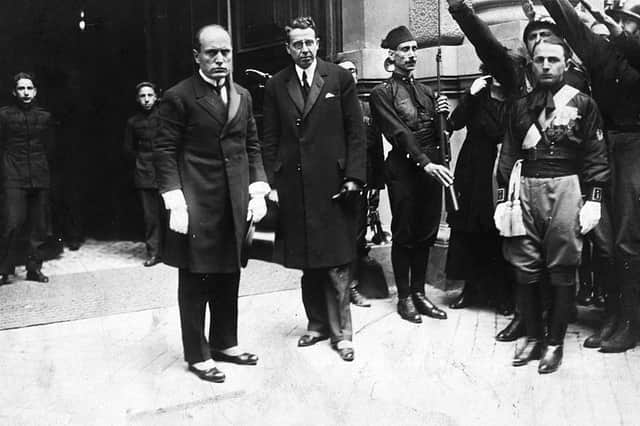Book review: 1922, Scenes from A Turbulent Year, by Nick Rennison


Scrapbooks are enjoyable. This one comes with a well deserved recommendation from William Boyd who calls it “a tremendous, beguiling read.” He is a good judge of such things, a couple of his best novels taking a fictional scrapbook form. Nick Rennison gives a chapter to each month, with five or six varied and well-chosen reports in each.
So, for instance, June gives us Enid Blyton’s first book (verse for small children), golf’s first American-born Open Champion in Walter Hagen and the outbreak of the Irish Civil War (August will bring the assassination of Michael Collins). It also gives us strikes and riots in the USA and the assassinations of the Irish-born British Field Marshal Sir Henry Wilson (as he returned from unveiling a War Memorial), and of Walter Rathenau, the German Foreign Minister, often judged the best hope of the Weimar Republic.
Advertisement
Hide AdQuite a month, you may say, but you can say that if every month Rennison recalls. There is scarcely a dull entry in his scrapbook. It was a great year for Vampire movies, made in Berlin, while Walt Disney conceived the idea of his greatest creation, Mickey Mouse. TS Eliot published “The Waste Land” and James Joyce Ulysses. Alfred Noyce, “now remembered, if at all, for ‘The Highwayman,’” called it “the foulest book that has ever found its way into print.” Marcel Proust died, his last word being (perhaps) “Maman”.


1922 saw the birth (or christening) of The Jazz Age, with the publication of Scott Fitzgerald’s second novel and the move of Lous Armstrong from New Orleans to Chicago to join King Oliver’s band. There was Prohibition in the USA, though not at President Harding’s White House, where whiskey flowed and corruption flowered. The revived Ku Klux Klan also flourished, absurd yet frightening.
Alexander Graham Bell died in August and “every single one of the 13 million telephones in the USA was put of action for a minute”. Einstein won the Nobel Prize for Physics. Hailed by a cheering crowd in Tokyo where he was on a lecture tour, he told his wife, “No living person deserves this sort of reception. I’m afraid we’re swindlers. We’ll end up in prison yet.”
One long-dead person became even more famous in 1922 when his tomb was discovered. This was, of course, Tutankhamun. “Within a year bands played the Tutenkamen Rag (the spelling of the young Pharaoh’s name varies) and in Paris his “Follies” were staged at the Folies Bergeres with the dancing girls waving enormous ostrich-feather fans in what was imagined to be the Egyptian style”.
The year saw civil war in China and the end of the Ottoman Empire, and following this the beginning of the end of the multi-ethnic, religiously tolerant, cosmopolitan Middle East. The last Hapsburg Emperor died in exile. Fascists marched (or sort of marched) to Rome and the King Victor Emmanuel foolishly and feebly invited Mussolini (who had arrived by train) to form a Government. It would not be long before Ernest Hemingway called him “the biggest bluff” in Europe and only a little longer before Winston Churchill hailed him as the “greatest law-maker of Europe today”. In Munich, meanwhile, an unpreposessing rabble-rouser called Adolf Hitler was making a noise, but the New York Times with typically astute judgement opined that his anti-Semitism was “not so genuine or violent as it sounded” and he was “using it as a bait to catch masses of followers.” Well, it did that, of course. On December 30, the Union of Soviet Socialist Republics came into formal being. It would last for 69 years, considerably longer than Hitler’s “Thousand Year Reich” but a short lifespan in comparison with the Ottoman Empire.
This is a delightful book, and Rennison’s selection is intelligent and lively. He has an eye for the significant detail and an agreeably dry tone. A review can pick out only a few plums, but as a Christmas pie it might satisfy even Little Jack Horner. I hope Rennison has a 1923 book already well in hand and is even now researching a 1924 one. This 1922 book should please those who are well-versed in history, but it will also be a treat for those for whom the past is another country.
Advertisement
Hide Ad1922: Scenes from A Turbulent Year, by Nick Rennison, Oldcastle Books, 255pp, £12.99
A message from the Editor:
Thank you for reading this article. We're more reliant on your support than ever as the shift in consumer habits brought about by coronavirus impacts our advertisers.
If you haven't already, please consider supporting our trusted, fact-checked journalism by taking out a digital subscription at https://www.scotsman.com/subscriptions